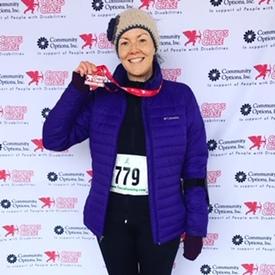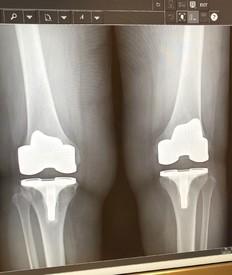Consistent weight gain/struggle with eating and exercise

lbkas
Posts: 2 Member
Hello everyone,
I have been consistently gaining weight for the past year. I went from 152 to 184 lbs ( I am 5'2"). Just in the last two weeks I have gained almost 3 lbs. I have been gluten free for 2 years now and don't eat horribly bad. I also have hypothyroid and Hashimoto's. My thyroid levels are pretty good right now and I have been on Levothyroxine for the past 4 years. I sit all day for work and I only really exercise on weekends (walking dog). Just this past weekend I cleaned for 40 minutes and my body felt so sore for days after. I recently saw a dietitian and have been tracking my calories this week, but still seem to go over my goal easily. It scares me that I keep gaining weight so quickly and I know it might have to do with my autoimmune disease, but I'm struggling already with eating healthy and adding more exercise. Any tips or advice for starting out on this journey?
I have been consistently gaining weight for the past year. I went from 152 to 184 lbs ( I am 5'2"). Just in the last two weeks I have gained almost 3 lbs. I have been gluten free for 2 years now and don't eat horribly bad. I also have hypothyroid and Hashimoto's. My thyroid levels are pretty good right now and I have been on Levothyroxine for the past 4 years. I sit all day for work and I only really exercise on weekends (walking dog). Just this past weekend I cleaned for 40 minutes and my body felt so sore for days after. I recently saw a dietitian and have been tracking my calories this week, but still seem to go over my goal easily. It scares me that I keep gaining weight so quickly and I know it might have to do with my autoimmune disease, but I'm struggling already with eating healthy and adding more exercise. Any tips or advice for starting out on this journey?
3
Replies
-
Everyone no matter their situation gains by eating more calories than they need. You said you go over your goal easily, so that's where you start. Make changes so that you can stay within your goals, it doesn't have to be "healthy", it has to be something you can stick to that's reasonably well-rounded. It takes some trial and error for many in the beginning to figure out what's going to work, what can be swapped where, but with some time and effort you'll get there.10
-
I gained my weight relatively quickly as well. I found myself feeling fat and out of control. I've been trying since August to get this under control. What I did was buy household items to make cooking from home more feasible (food scale, crock pot, vacuum sealer). But I couldn't get myself to work out (I ride horses but other than that I couldn't get myself in the gym or any actual exercise). I just tried to change one thing at a time. I figured even if I was cooking things that weren't the healthiest I would save money by making it at home and I also wouldn't consume nearly as many calories as restaurant food (seriously what do they put in that food???). Then I started tracking and measuring my food. And I have decided to do dietbets this year (18 lbs down so far woohoo!) because I am motivated by money I've realized!Now that I am comfortable with tracking my food and I have lost weight, I signed up for 3 months of personal training twice a week.
Just pick a few things to change here and there and once you get good at it, you can pick something else. I would say don't be too hard on yourself. Yes, be honest with yourself but if you have a bad day think about one thing you can change the next day. One mindset that has helped me tremendously is just because you had a "bad" snack or went over your calories, doesn't mean you can just spoil the rest of your day... those extra 200-400 calories just because you "already ate poorly" does add up.6 -
It's all about eating really. How many calories you consume vs. how many calories you burn. You are eating too many calories and therefore you are gaining weight. Exercise is nice and makes us feel good, most of the time, but it is not needed for weight loss. start measuring/weighing everything you eat and logging it daily...every single thing that goes in your mouth, including drinks.
You'll be surprised by how many calories you are eating.3 -
The calorie tracking has already been overwhelming for me this week. Just today I barely have 400 calories left and I just finished lunch! I should be eating between 1200-1400 calories a day and I go over that very quickly. I get hungry often, especially at night before I sleep. My worst habit is eating too much at dinner time. I usually get seconds and sometimes thirds, but sometimes it's just extra veggies. This week I brought some healthier snacks like carrots and hummus, almonds, and apples and peanut butter. I guess it's just going to take some time to get used to this because my body is so used to eating a certain way.3
-
The first couple of weeks I was STARVING! At least I thought I was.... because now I eat between 1200-1500 a day (depends on exercise and such) and I feel hungry at times but nothing a little stroll and a glass of water won't fix.
Do you weigh your food? Seriously this is the best thing to do ever. Seems daunting but keep your scale in an easy to reach place. And you get to eat so much more than you think then when you just eye ball or use measuring cups and your calories will be more accurate! Be careful with nuts... they are good for you but you really don't get to eat all that many because they are very high in calories. I'm a volume eater. I like a really large dinner so I save between 500-600 calories just for dinner. Then I have a light breakfast, lunch, a snack then I get my big filling dinner. This doesn't work for everyone but when I tried to spread my calories out equally throughout the day I was always going over my calories at night. It does take a lot of trial and error. Just try different things... pay attention to how they make you feel and make adjustments from there.4 -
At some point your going to have to ride thru that hunger and stop after the first helping.
How much water are you drinking? A lot of times people mistake thirst for hunger.
Also..... I find if I get a good portion of protein at lunch it helps tide me over thru the afternoon and into dinner.
One last thing..... Eating healthy is wonderful..... but healthy food IS NOT calorie free.10 -
I don't know much about thyroid issues, but it's my understanding that hypo actually slows down your metabolism. So, you can gain weight eating similar calories to what you were before. The disease progresses over time. It doesn't make it impossible to lose, but you really have to adjust and watch your calorie intake. It's almost like it puts you back some steps in the weight loss journey. Good luck!0
-
leejoyce31 wrote: »I don't know much about thyroid issues, but it's my understanding that hypo actually slows down your metabolism. So, you can gain weight eating similar calories to what you were before. The disease progresses over time. It doesn't make it impossible to lose, but you really have to adjust and watch your calorie intake. It's almost like it puts you back some steps in the weight loss journey. Good luck!
If the OP is properly medicated (she says her levels are fine), being hypo will have no effect on her weight. I have no thyroid at all and manage my weight. Being hypo can make screw with your hunger signals, and make you feel too fatigued to move much, but being properly medicated takes care of that.1 -
While it is true that you should get an accurate counting of the calories you use, and that your weight will reflect the difference between calories in and calories out, there is some recent research published in the New England Journal of Medicine indicating that different people burn calories at a different rate, even after exercise is controlled for. http://www.nejm.org/doi/full/10.1056/NEJM199005243222101
If possible, see if you can get an assessment of your metabolic rate, and do some research on how to increase it. Good luck.1 -
VioletRojo wrote: »leejoyce31 wrote: »I don't know much about thyroid issues, but it's my understanding that hypo actually slows down your metabolism. So, you can gain weight eating similar calories to what you were before. The disease progresses over time. It doesn't make it impossible to lose, but you really have to adjust and watch your calorie intake. It's almost like it puts you back some steps in the weight loss journey. Good luck!
If the OP is properly medicated (she says her levels are fine), being hypo will have no effect on her weight. I have no thyroid at all and manage my weight. Being hypo can make screw with your hunger signals, and make you feel too fatigued to move much, but being properly medicated takes care of that.
Gotcha. That makes sense.0 -
The calorie tracking has already been overwhelming for me this week. Just today I barely have 400 calories left and I just finished lunch! I should be eating between 1200-1400 calories a day and I go over that very quickly. I get hungry often, especially at night before I sleep. My worst habit is eating too much at dinner time. I usually get seconds and sometimes thirds, but sometimes it's just extra veggies. This week I brought some healthier snacks like carrots and hummus, almonds, and apples and peanut butter. I guess it's just going to take some time to get used to this because my body is so used to eating a certain way.
It's going to be important to understand what will give you good nutrition, keep you full (this part is very individual), but still be low in calories. The "healthier snacks" you list are nutritious, but both almonds and peanut butter are quite high in calories, and some brands of hummus are pretty high as well. Weight loss is entirely about managing the calories (but nutrition is important for overall health, of course).
I'm hypothyroid, and pretty old besides (62), but have been able to lose 50+ pounds and maintain a healthy weight for 2+ years since, using MFP.
I don't know whether you'll find it helpful or not, but this is a post I wrote about one possible way to approach the eating part of the process:
http://community.myfitnesspal.com/en/discussion/10636388/free-customized-personal-weight-loss-eating-plan-not-spam-or-mlm
Best wishes!2 -
Just a thought - but if you walked that hound before work (or before bed weekdays or whatever) - you could add some more activity to your life.
Being over weight is not good. But being under excercised is really bad for you - your health , your self esteem, your mood, your calories used up etc. Why not aim for one midweek walk a week and then build from there?
(I say this as some one who also has to manage a health condition ....)
Good luck with the 'calories in' too!
0 -
What does your dietitian say? I'd imagine there might be foods to limit/avoid if you have thyroid issues/Hashimoto's. I recently took out several foods out of my diet and I kid you not, my weight has dropped. Some foods are harder to process for people. I haven't lost weight like this in like 5-6 years and I think it was because of what foods I was eating and removing the stuff that was keeping me heavier than I am currently. I feel 100x better. I'm not tired, achy, lower back is tight, allergies are better, etc.
In short, your dietitian if they're knowledgable, should be able to help with food choices to help with your health issues.
I just googled a little info online and here's some information about foods to eat/avoid if you have an autoimmune disease https://drknews.com/autoimmune-gut-repair-diet/. While I don't have this, I have removed some of these items and while it looks overwhelming depending where you're at with your food habits, take baby steps Maybe try removing 1 food and seeing how you do. I've learned how much what we eat can change drastically how we feel. I hope this helps and you feel better!1 -
1200 calories may be too few for you. Instead of trying to lose weight as quickly as possible, set your goal to 1 pound a week.
Nuts are tasty, but they are very fattening and it takes a lot to feel full. Find foods that fill you - possibly more protein, maybe more fiber.
Weigh everything you eat. Log everything you eat. Look at what you are eating and see where you can cut back. I learned that restaurant meals are very fattening for me. It doesn't take much to add up to 1000 or more calories. The more I eat out, the fatter I get.
I used to have a problem with eating seconds and thirds. I learned to wait half an hour to see if I was actually still hungry or if I was just eating from habit. I no longer eat seconds.
Your dog will happily walk with you every day. Go before or after dinner or before bed. Perhaps a family member will also enjoy walking with you. On weekends go farther or do something else you enjoy - biking, swimming, skiing, dancing . . . Incorporate more movement in your daily life. Walk stairs, park at the far side of the lot, do some yoga or calisthenics while you are watching TV. If you burn more calories, you can eat more, plus it is generally good for your health.2 -
I have hashimotos as well. When my levels are good I do lose with CICO, although I also require less calories than this site suggests by a couple hundred (the difference is small). While I know most people will tell you exercise isn’t needed for weight loss I can tell you I was personally never successful without it. I started with a few 30 min workout dvds at home.
Also, play with your macros. I feel fuller eating more fats and proteins. Focusing on those foods helps me eat less without being hungry. Other people do better with a high carb diet. It’s very individual.
Feel free to add me2 -
The calorie tracking has already been overwhelming for me this week. Just today I barely have 400 calories left and I just finished lunch! I should be eating between 1200-1400 calories a day and I go over that very quickly. I get hungry often, especially at night before I sleep. My worst habit is eating too much at dinner time. I usually get seconds and sometimes thirds, but sometimes it's just extra veggies. This week I brought some healthier snacks like carrots and hummus, almonds, and apples and peanut butter. I guess it's just going to take some time to get used to this because my body is so used to eating a certain way.
Hummus, almonds, and peanut butter are calorie bombs. As others have said, it's not about healthy, it's about calories.2 -
Add more veggies to every meal to bulk them up. And while exercise isn't necessary for weight loss, it will give you a few more calories to play with and better your quality of life. But you need to build up your exercise slowly. Start with adding a little bit to your every day and increase it a small amount every week. Walking is perfect to start with. You don't need to push too hard. I've been in the spot where you get tired out super easy and exercising too hard (for you) can make it where you're too fatigued to do anything for days. That doesn't help anyone. A slow and steady buildup can do wonders though. It may not seem like you're doing much at first but over time you'll really notice the difference.2
This discussion has been closed.
Categories
- All Categories
- 1.4M Health, Wellness and Goals
- 394.9K Introduce Yourself
- 44K Getting Started
- 260.6K Health and Weight Loss
- 176.2K Food and Nutrition
- 47.5K Recipes
- 232.7K Fitness and Exercise
- 444 Sleep, Mindfulness and Overall Wellness
- 6.5K Goal: Maintaining Weight
- 8.6K Goal: Gaining Weight and Body Building
- 153.2K Motivation and Support
- 8.2K Challenges
- 1.3K Debate Club
- 96.4K Chit-Chat
- 2.5K Fun and Games
- 4.2K MyFitnessPal Information
- 16 News and Announcements
- 1.3K Feature Suggestions and Ideas
- 2.8K MyFitnessPal Tech Support Questions












